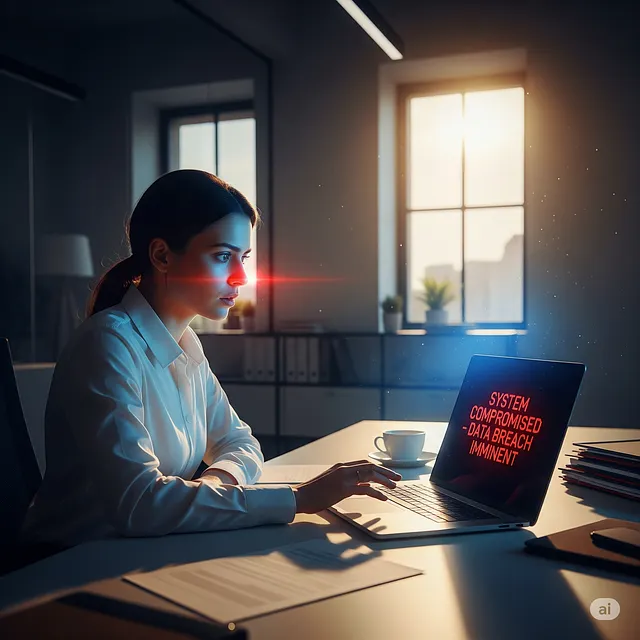**The Day Justice Stalled**
*Inspired by real events*
On a chilly spring morning in April 2025, Sarah Collins, a legal aid solicitor in Birmingham, turned on her laptop to prep for a client meeting. Her inbox was eerily quiet. No new case alerts. No payment confirmations. Just an email marked URGENT: “Legal Aid Agency services are temporarily unavailable due to a technical issue.”
Initially, she thought it was standard maintenance. However, by noon, the whispers had escalated to panic. The Legal Aid Agency (LAA), the governmental entity that funds lawyers for those unable to pay legal fees, had suffered a substantial cyber attack.
**Blackout of Justice**
The LAA’s digital portals, utilized daily by thousands of attorneys, had gone dark. No case inputs. No billing. No payments. For Sarah, this meant weeks without pay. For her clients, many facing eviction, wrongful termination, or deportation, it translated to justice deferred.
Behind the scenes, the National Crime Agency (NCA) and the National Cyber Security Centre (NCSC) were reconstructing a dire scenario. Hackers had accessed systems containing personal records dating back to 2007.
The purloined data included names, addresses, birthdates, national insurance numbers, criminal records, financial details, and delicate employment information (Ministry of Justice, 2025).
**Ripple Effects**
By May 16, officials acknowledged the breach as “significant,” possibly the largest in the agency’s history (Reuters, 2025).
The immediate consequences were apparent:
Thousands of lawyers were left unpaid, forcing some to halt or abandon legal aid work.
Clients encountered case delays and, in some cases, lost their right to swift representation.
A manual, paper-based system supplanted online processing, resulting in severe backlogs.
One barrister noted receiving just £9.50 in contingency payments for an entire week’s work (The Guardian, 2025). Another attorney recounted weeping at her desk after informing a domestic abuse survivor she could no longer manage her case due to the funding breakdown.
**Overlooked Aspects**
The attack wasn’t only about stolen files. It concerned trust. Legal aid addresses the needs of society’s most vulnerable: refugees, abuse victims, wrongly accused defendants, and families in turmoil. For them, a compromised database isn’t merely a privacy breach. It’s a potential weapon when misappropriated.
Cybercriminals could exploit this data for deceit, extortion, or coercion. Unlike credit card numbers, you can’t “cancel” a criminal record or tweak your birthdate.
**Reasons Behind the Attack**
Multiple findings showed that the LAA was operating on antiquated systems, which experts had flagged as vulnerable (Law Society, 2025). Persistent underinvestment in cybersecurity left the agency exposed.
In cybersecurity parlance, this was a “low-hanging fruit” attack, implying the hackers didn’t require sophisticated tools, just patience and the right exploit.
**The Larger Lesson**
Sarah’s ordeal isn’t just about one solicitor’s struggle. It’s a cautionary tale for all public institutions. Cybersecurity isn’t optional. It’s essential infrastructure. Just as bridges need upkeep to prevent collapse, so do digital systems.
The LAA breach demonstrated that a lone cyber incident could halt justice across a nation. It also underscored that those most impacted typically have the least capacity for recovery.
**Protecting Against Future Breaches**
Even if you aren’t a lawyer, you can take cues from this:
– Employ strong, distinct passwords for each account.
– Activate multi-factor authentication (MFA) wherever feasible.
– Regularly update software to address known vulnerabilities.
– Be wary of emails soliciting sensitive details.
Cybersecurity is a collective responsibility. If we leave the door open, someone will inevitably enter.
**Epilogue**
Sarah’s cases are slowly advancing again, though some clients have slipped through the cracks. The LAA assures reforms. Politicians promise funding. Sarah realizes that while promises come easy, ensuring security is arduous.
In justice, even a single day’s interruption can alter lives irreversibly.
The Day Justice Stalled © 2025 by Ododoobari John Okpabi is licensed under CC BY-NC-ND 4.0. For a copy of this license, visit https://creativecommons.org/licenses/by-nc-nd/4.0/

